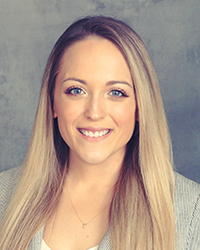
Stacia Griebahn, Medical Student Component President
The transition from medical school to a residency in anesthesiology is a well-deserved honor. But it comes with a number of future considerations, from ranking residency programs to student loans. Saturday’s Medical Student Program explores a wide spectrum of decision-making.
Stacia Griebahn, a medical student at St. George’s University in St. George, Grenada is among the moderators at Saturday’s session. Griebahn is President of the ASA’s Medical Student Component and she says the day-long session is perfect for medical students on the cusp of entering residencies.
“One of the main purposes of the session is to expose students to the specialty of anesthesiology. Typically, anesthesiology is not part of a medical student’s curriculum,” said Griebahn.
The session opens with Keynote speaker Francis S. Collins, MD, PhD, who will present “Exceptional Opportunities in Biomedical Research.” From there, subject matter experts will detail such topics as the “ABCs of Anesthesia,” “What You Always Wanted to Know About Residency,” “Ranking Programs Despite the Unknowns,” “Got Student Loans?” and “How to Shine in Virtual Interviews.”
Among a medical student’s chief priorities is ranking and selecting a residency fit, Griebahn said. Key considerations, such as standardized test scores and quality of life, are top of mind.
Medical Student Program
9 a.m. – 3 p.m. CT
Saturday, October 3
When ranking programs, Griebahn advises students to keep all their top choices. Don’t take something off the list, she said, just because you believe they won’t select you. Also, consider whether or not you would be comfortable spending a lot of time with the people in the program.
Another burning concern is student loans, Griebahn said. While the pandemic spurred student loan forgiveness and deferral programs, the anesthesiology specialty may not benefit from those same programs. Most were designed for general practice fields, Griebahn said. She advises students to consider loan repayment options after finding the right match.
“It can be overwhelming to think about loans when you first graduate. That’s the reason we have these sessions during the annual meeting, so students can understand what’s available,” Griebahn said. “There are tons of options. Just do your research and explore available options.”
Finally, medical students who attend the day-long session will acquire plenty of tips for interviewing during the pandemic. Griebahn reminds students to find a spot with the best lighting and internet speed, while preparing in advance by doing their homework about the program. She recommends having questions ready and not asking questions that have already been answered by the program’s webpage.
“There are some pros to virtual interviews, including being able to interview on the east coast in the morning and the west coast in the afternoon, no travel expenses and the opportunity to interview with more programs,” she said.
Return to Index